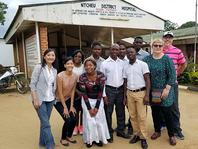Yih collaborates in Malawi healthcare work
The project, "Spatial Redesign for Family-Centered Kangaroo Mother Care Center", aims to save the lives of premature babies by redesigning the layout and furniture for Kangaroo Mother Care (KMC) facilities.
Yuehwern Yih, professor of industrial engineering, and her research team are working with Save the Children to improve KMC care for low-birthweight, premature infants in resource-poor areas. She is also collaborating with Steve Visser, professor of industrial design. In January and February, Yih and Visser visited three Malawi hospitals to learn more about KMC, select a hospital in which to conduct a spatial redesign project, and meet with local collaborators.
The KMC program was first established in Malawi in 1999, funded in part by USAID. This program seeks to save the lives of premature infants by training their mothers to keep the babies warm by carrying them on the front with skin-to-skin contact, and nursing the baby regularly with a fixed schedule. Save the Children wanted to expand the KMC program in Malawi to benefit more premature babies, but experienced spatial challenges in doing so. The Purdue Global Engineering I2D Lab brought Save the Children and Yih together to work on this project.
While in Malawi, Yih met with Save the Children personnel and visited the Polytechnic College (part of the University of Malawi), where six undergraduate engineering students are working on this project with the team. They visited three hospitals - Queens Regional Hospital, to view an advanced KMC program going on in a large space; and two district hospitals, Ntcheu and Ntchisi, to evaluate as potential project implementation sites. Since only one could be chosen for the KMC program - and Ntchisi is under construction to expand its KMC space - the team chose Ntcheu as the site for their project.
"We wanted to pick a facility that is more representative to the rest of the district hospitals [in terms of space], so this intervention can be adopted to other facilities," explains Yih.
The project's next steps will include:
-
designing and installing new baby cribs, beds, and chairs
-
creating a new layout to utilize the space more efficiently
-
designing new charts to track Neonatal Intensive Care Unit (NICU) babies participating in KMC
-
training healthcare providers to start KMC programs for NICU babies and to track each NICU babies
-
educating mothers with NICU babies about KMC's benefits and how to follow it
-
collecting data on people flow, number of NICU babies participating in KMC, and perceptions of providers, mothers, and families about KMC
Yih feels the trip was a success because the research team learned more about KMC and its unique challenges in Malawi, selected a hospital for the intervention, met with stakeholders and local collaborators, and participated in a furniture design brainstorming session with Polytechnic students and physicians led by Prof. Visser.
Yih and her team are partnering with Save the Children to reduce the neonatal mortality rate in Malawi. If successful, this program could benefit other countries as well.
This is the second recent project that Prof. Yih has in Africa. Read more: Yih project receives Gates Foundation award and http://www.purdue.edu/newsroom/releases/2017/Q4/purdue-researchers-receive-grand-challenges-explorations-grant-for-projects-to-help-expecting-mothers.html
Writer: DeEtte Starr, starrd@purdue.edu

